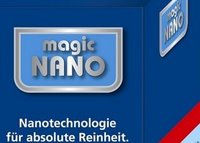 Gannett writer Erin Kelly's report this week on nanotech and the environment begins with the extremely thin "news" angle of "Magic Nano" gone horribly awry.
Gannett writer Erin Kelly's report this week on nanotech and the environment begins with the extremely thin "news" angle of "Magic Nano" gone horribly awry.
"A preview of what could go wrong happened just last week in Germany, where "Magic Nano" -- a glass and ceramic tile cleaner in an aerosol can -- was recalled by the manufacturer after nearly 100 consumers reported problems breathing."
The main question is neither asked nor answered: Is this a nanotechnology-enabled product, or just a product that uses “nano” in its name?
In the end, though, it hardly matters. As I've written ad nauseam here over the past few years, it is perception that matters (see here, here and here). And to the Gannett reporter's credit, as much is said further down in the story.
"Business leaders said they fear that American consumers could reject nanotechnology -- in much the same way that most Europeans have rejected genetically modified food -- unless they are convinced that protections are in place. The perception of danger by the public -- even if it isn't based on fact -- can kill nanotechnology before its benefits are realized, analysts say."
So, what’s important here is the perception of risk and not actual risk. It makes no difference that Magic Nano does not use nanotechnology. In the public mind, it does, so get over it and go from there. It’s part of a nano dumb show being acted out in public.
Like Lux Research VP Matthew Nordan told the House Science Committee late last year:
" 'Responsible development of nanotechnology -- to ensure that the U.S. obtains the full benefits of nanotechnology applications -- requires addressing both real and perceptual risks.' He added, 'Even if studies showed every commercially relevant nanoparticle to be harmless in every real-world usage scenario, public skepticism about the safety of nanoparticles could still build and sharply limit the use of nanoparticles in products -- similar to the situation encountered with genetically modified organisms in Eurpoe.' "
Matthew is one of the few nanotech industry boosters who “gets it” and will say so in public. He also told the committee (sorry, I do not have a link to the following quote, but it was reported in the Daily Environment Report, No. 223, p. A-5, Nov. 21, 2005, a publication of the Bureau of National Affairs Inc.
“When it comes to public perception, said Nordan, 'it only takes one bad apple to spoil the bunch.' Unfortunately, he added, industry has done 'exceedingly little' on these issues. The problem, Nordan said, is that industry startups that are doing a lot of nanotechnology innovation often avoid such questions so that they do not scare off investors. But such behavior, he added, will be very self-destructive in the long term.”
Having worked both apart from, and inside, the industry I can unequivocally say that Nordan's statement is accurate.






